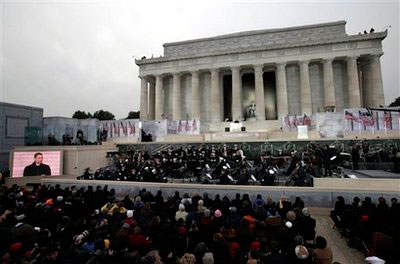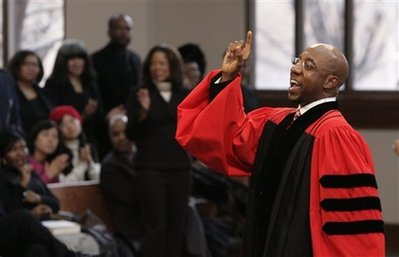WASHINGTON – The African American Church Inaugural Ball on Sunday was just one of many balls celebrating Barack Obama, who will be sworn in Tuesday as the first black president of the United States.
But it may have been one of the most significant inaugural events, as many believe that without the African American church, they would not be witnessing this momentous time in history.
"People asked 'Why an African American Church Inaugural Ball?'" Roland S. Martin, a nationally syndicated columnist and master of ceremony at Sunday's ball, said to hundreds gathered at the Grand Hyatt Regency Hotel.
"Without the African American church, we couldn't have gotten through all of that," he said, referring to a montage of celebrated African Americans who paved the way for the election of the country's first president of African descent.
It is certainly a time of jubilee, pride and honor for the African American church. Each time President-elect Obama was mentioned or shown in a video, attendees at the ball excitedly arose in applause and shouts of joy.
"No one can fully understand the joy, the significance, the celebration that the African American church feels for the election and the inauguration of Barack Obama," Rick Warren, pastor of Saddleback Community Church in Lake Forest, Calif., commented to The Christian Post while attending the ball. "It's amazing."
While they praise the 44th president and the glass ceiling he has shattered, many have not forgotten the sacrifice and the faith that has brought them to this point.
"We have come this far by faith, we've been saved by faith, we have marched by faith, we've protested by faith, we got the Voting Rights Act by faith and now Barack Obama has achieved this monumental historical moment by the faith of so many, not just black people, but black and white and Asian," said Bishop Donald Hilliard of Cathedral International and co-chair of the inaugural ball.
"So many have brought us this far by faith, but the ancestors in particular, Dr. King and others that were beaten and stoned and hosed down – their faith and their tenacity have brought us this far," he added.
For Hilliard, all that he hoped for has already been achieved for him and the church, he said, noting that "the winds have changed."
His sentiments carry through with much of the black community, with 69 percent saying they believe Martin Luther King Jr.'s vision for race relations has been fulfilled, according to a new CNN poll.
From the stench and struggles of slavery to the White House, the black community has surely come far, as the Rev. Dr. Otis Moss, Jr., senior pastor emeritus of Olivet Institutional Baptist Church in Cleveland, Ohio, noted.
"You (God) have brought us to this moment," Moss said in the invocation at the ball. "We thank you ... [for] what you can bring forth from the rich soil of Kenya and the corn fields of Kansas; we thank you for a new first family. We hear the drumbeat of childhood feet moving from room to historic room in the White House."
That night, 25 honorees were named and recognized for the heavy burdens they carried and the doors of opportunities they opened for the African American community. The honorees included African Methodist Episcopal Bishop the Rt. Rev. John Hurst Adams; Dr. Marian Wright Edelman, who established the Children's Defense Fund; the Rev. Joseph Lowery, a key figure in the civil rights movement; General Colin L. Powell, former secretary of state; and Desmond Mpilo Tutu, who spoke out against apartheid.
"Without these people, Barack Obama would not be here," said Congresswoman Maxine Waters, representing the 35th District of Columbia.
And now, with Obama soon to be seated at the highest office in the country, "the door is forever opened," as the Rev. Dr. W. Franklyn Richardson, II, chair of the inaugural ball, stated, noting that Obama has shown to the world what is possible.
In addition to paying tribute, the African American Church Inaugural Ball made a commitment to fight HIV/AIDS. Organizers expressed support for The Balm in Gilead, a non-profit organization that works with churches to address life-threatening diseases, especially HIV/AIDS.
















